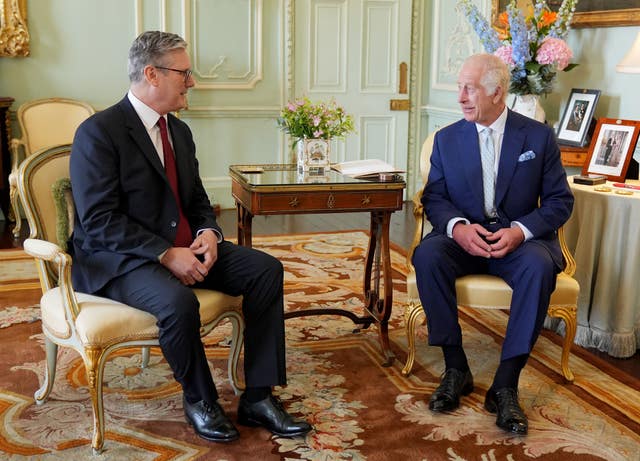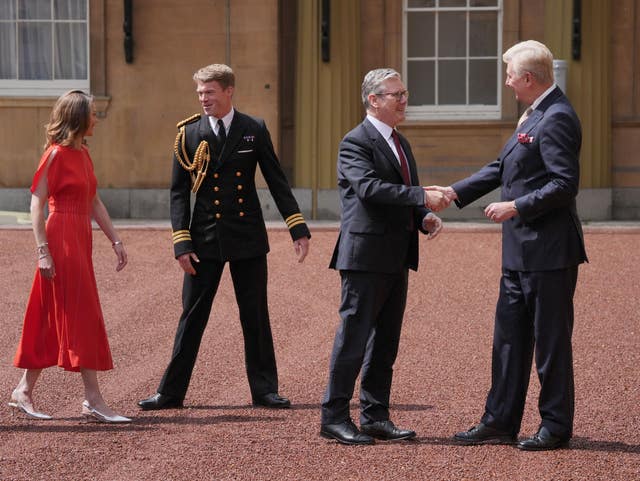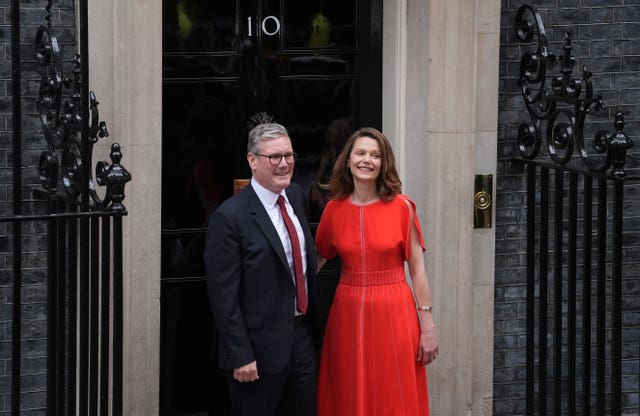King tells Starmer: You must be ‘utterly exhausted and nearly on your knees’
Charles welcomed the Labour leader to Buckingham Palace as he prepared to appoint him as the UK’s next prime minister.

The King sympathised with Sir Keir Starmer during their historic meeting, telling the new Prime Minister he must be “utterly exhausted and nearly on your knees”.
When Charles chatted to the Labour leader during their Buckingham Palace audience, the King also highlighted how getting to “grips with everything straight away” must be taxing.
Sir Keir became the third prime minister of the King’s reign following a well choreographed series of meetings ensuring the smooth handover of power.
Charles played a central role during the busy aftermath of the General Election that left the Conservatives reeling following a crushing defeat as the Labour Party won a landslide.
Even the weather played its part, with a downpour drenching Rishi Sunak when he announced six weeks ago that the country would go to the polls.
When Sir Keir arrived at Buckingham Palace, the rain clouds parted and the sun shone.
Buckingham Palace said the Labour leader “kissed hands” with the King on his appointment as Prime Minister but, in reality, the historic term is believed to refer to a handshake.
Before the crucial moment, the two men were filmed as they met and the King initially told Sir Keir: “You must be utterly exhausted and nearly on your knees, quite a week by the sound of things.”

The politician replied, “not much sleep” and commented about the transition of power from one prime minister to the next: “It’s a very, sort of, quick change over.”
The King added: “I know, to say the least, and having to get to grips with everything straight away must be quite exhausting,”
Earlier, Mr Sunak was joined by his wife, Akshata Murty, for his final audience with the King as he resigned as prime minister and recommended the Labour leader be invited to form a new government.
When he first arrived for the meeting, which lasted about 30 minutes, Mr Sunak exchanged a few words with Sir Clive Alderton, Charles’s most important aide, and appeared to joke about his favourite meal.
He told the King and Queen’s principal private secretary: “I’ve been eating plenty of sandwiches on the road.”

Mr Sunak had told ITV’s This Morning earlier this week: “Well, my favourite meal generally is sandwiches. You know, I’m a big sandwich person.”
The politician and his spouse left privately, but waiting outside were dozens of spectators who held up camera phones to record their departure.
Buckingham Palace said later: “The Right Honourable Rishi Sunak MP had an audience of the King this morning and tendered his resignation as prime minister and first lord of the Treasury, which His Majesty was graciously pleased to accept.”
Within the hour, Sir Keir swept into Buckingham Palace just after noon in a chauffeur-driven car and was joined by his wife, Lady Victoria Starmer, who works in occupational health for the NHS.
The couple were also welcomed by Sir Clive. Also present to greet them was Charles’s equerry, Royal Navy Commander William Thornton.

A heavy shower had fallen just before Sir Keir arrived and as he stepped from his car the sun broke through, and he appeared to reference the turn in the weather as Sir Clive looked to the heavens and replied: “How about that?”
Their historic meeting saw Sir Keir follow Mr Sunak and Liz Truss to become the head of state’s third prime minister.
Buckingham Palace said: “The King received in audience the Right Honourable Sir Keir Starmer MP today and requested him to form a new administration. Sir Keir accepted His Majesty’s offer and kissed hands upon his appointment as Prime Minister and First Lord of the Treasury.”
Lady Starmer joined the two men towards the end of their meeting that lasted about 20 minutes, and at its conclusion the Prime Minister and his wife headed to their new home in Downing Street.
During her more than 70 years on the throne, the late Queen saw 15 prime ministers. After Churchill, she appointed Sir Anthony Eden, Harold Macmillan, Sir Alec Douglas-Home, Edward Heath, Harold Wilson, James Callaghan, Margaret Thatcher, John Major, Tony Blair, Gordon Brown, David Cameron, Theresa May, Boris Johnson and Liz Truss.





